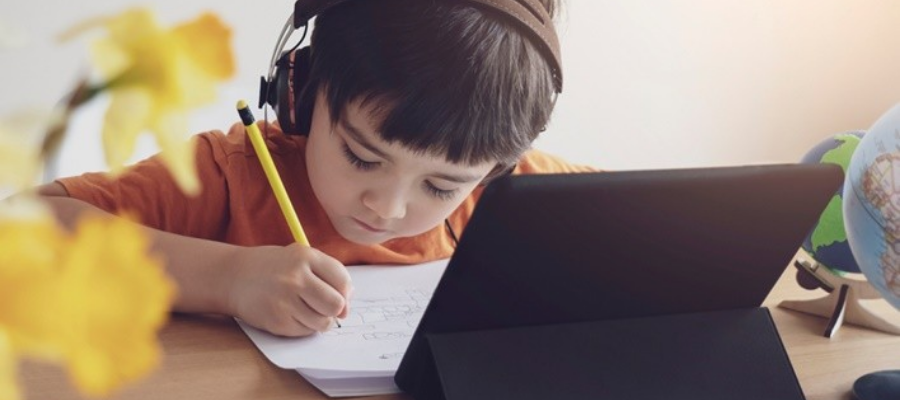How to continue education for sustainable development during the pandemic: Practitioners share innovations in digital and distance learning
At the second edition of UNESCO's webinar series on "The Transformative Power of Education for Sustainable Development (ESD) for the World Beyond the Covid Pandemic"19 , practitioners shared their experience of creatively integrating ESD into digital and distance environments, and how to build structures to ensure the continuity of ESD learning.

On 14 October 2020, some 600 participants joined UNESCO for the online seminar "ESD in digital and remote environments : Lessons learned from the COVID-19 pandemic" (click here to view in English - French - German) which showcasededucators using innovative methods and technologies to make ESD learning possible despite difficult circumstances.
A survey showed that 94% of seminar participants continued learning ESD in some form during the pandemic (67% full-time, 27% part-time) and the majority did so via the Internet or telephone.
During the interview, ESD practitioners from four different regions of the world shared how they continued ESD despite the difficult situation during the pandemic.
Working together to adapt quickly to the situation
Yusuke Morita, Professor at the Faculty of Humanities at Waseda University in Japan, shared the example of the city of Kumamoto where schools have used online interactive collaboration applications. Different actors, such as schools and local authorities, worked together to adapt quickly to the new situation and ensure continued learning of ESD. Professor Morita reported that this collaboration between different actors in the education sector and local communities was a great success and that ESD learning was able to resume online quickly after the announcement of social distancing measures and the closure of schools.
Maintaining a sense of ownership and expanding the community of practice
Thanks to a collaboration with TedX, the Earth School digital learning platform is accessible and includes modules that can be easily followed by both independent learners and learners who need parental involvement. In less than 30 days, fifty facilitators from around the world collaborated to create an online resource for World Earth Day 2020.
Kathleen Usher, a science specialist with the English Montreal School Board in Canada, was one of the facilitators of the Earth School Project and described how the creators made learning on this online platform more active, with activities that learners can easily complete at home and connect to their daily activities and lives.
Ensuring that social and emotional learning continues during the pandemic
Maria Anagnostidou, a teacher at the 3rd Primary School of Serres, Greece, also stressed the importance of feeling connected and emotionally engaged. For her, social and emotional learning and creating a sense of belonging to a community is a major challenge with theShe also shared stories of how she involved her students in ESD activities during the pandemic: with a school in Poland, she designed several online exhibitions and activities that students were able to create and present independently online. She used international days to engage students in activities, such as World Bee Day to learn more about beekeeping and pollen or International Food Day to talk about food and nutrition.
Making ESD learning accessible and inclusive
Cristian Vélez Ramirez, Education Coordinator at the Amazon Rescue Center (CREA)and Amazon Forever in Peru, stressed the importance of inclusiveness. and gave examples of how ESD learning was being shared with young people in the country, on the internet, television and also on the radio. The initiative was part of the "I learn from home" programme of the Peruvian Ministry of Education - "I learn from home". Aprendo en casa', including the programme 'One Child, One Radio' for young learners in remote locations without access to the Internet. Cristian and his colleagues have also transferred many of their educational activities online, reaching learners who would normally have come to the Amazon Rescue Center.
Speakers concluded that collaboration between different actors in communities and making digital and distance ESD programmes more attractive and action-oriented are essential elements for the continuation of ESD during the pandemic. They stressed the need to support teachers to help them facilitate ESD in digital and distance environments, as well as to explore new technical possibilities, including virtual reality, depending on the context and available resources.
When asked what they could do better or differently in the case of other confinement, stakeholders responded by stressing the importance of collaboration with parents, private donors, NGOs and the private sector.s or local authorities to ensure that structures are improved to bridge the digital divide and provide access to the Internet and terminals. Another lesson learned from the experience of remote environments was that finding creative solutions adapted to the local context can reduce the digital divide, for example if theAnother lesson learned from the experience of remote environments was that finding creative solutions adapted to the local context can bridge the digital divide, for example by providing battery-operated radios to students in remote environments and focusing on audio courses and podcasts to enable distance learning without the need for Internet access. Speakers shared the same observation from the early months of the pandemic that distance learning from home can be a potential entry point into thelearning environment and provides an opportunity to involve families and the community in holistic ESD learning through action-oriented strategies. These action-oriented elements are also essential for creating a healthier learning environment for students and avoiding long hours of screen time.
This event is part of a series of webinars organized by UNESCO in cooperation with the Ministry of Education of the Federal Republic of Germany.The event is part of a series of online seminars organized by UNESCO in cooperation with the German Federal Ministry of Education and Research and the German National Commission for UNESCO in preparation for the UNESCO World Conference on ESD.
- Watch the seminar
- More information on the seminar series
- Learn more about the first edition of the Online Seminars.
Source: en.unesco.org


